Table of Contents Show
In the intricate fabric of human beliefs, prayer has long held a significant place, serving as a cornerstone of spiritual and religious practices across cultures and centuries.
However, in contemporary society, a noticeable shift has emerged, leading many to question and even forgo the act of prayer altogether.
A complex interplay of philosophical, psychological, and societal factors has contributed to this phenomenon, challenging the traditional role of prayer in people’s lives. Understanding the multifaceted reasons behind the growing reluctance towards prayer is crucial in navigating the intricate dynamics of modern spirituality.
Why We Don’t Pray
In a world characterized by constant hustle and bustle, the act of prayer, once a deeply ingrained practice, seems to be gradually fading from the forefront of people’s lives. Amidst the myriad of factors influencing our daily routines, various reasons contribute to the declining trend of prayer. While it remains an essential aspect of many religious traditions, its diminishing presence raises critical questions about the contemporary human experience and the evolving nature of spirituality.
Understanding the Significance of Prayer
Initially, comprehending the multifaceted significance of prayer is crucial. It serves as a means of communication with a higher power, offering solace, guidance, and a sense of connection to something beyond the material realm. Throughout history, prayer has been a fundamental practice embedded in cultural and religious customs, providing individuals with a source of hope and strength during challenging times.
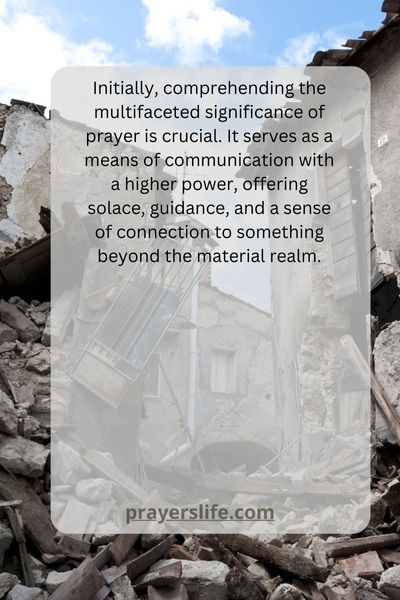
Busy Lifestyles and Time Constraints
In today’s fast-paced world, individuals find themselves entangled in a web of demanding schedules, leaving little room for contemplation or spiritual practices. The pressing demands of work, family, and social obligations often overshadow the moments of quietude necessary for prayer. As the pursuit of professional success and material aspirations intensifies, the time for introspection and spiritual nourishment steadily diminishes.
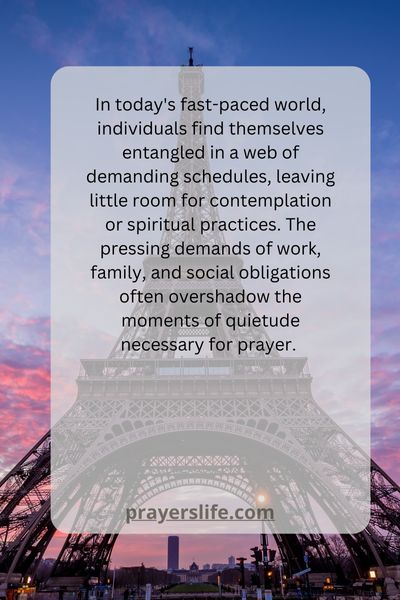
Lack of Belief or Skepticism
Moreover, a growing segment of the population questions the efficacy of prayer or holds varying degrees of skepticism towards organized religion. With the rise of scientific rationalism and empirical reasoning, the traditional concepts associated with prayer and divine intervention may appear incongruent with contemporary intellectual pursuits, leading many to dismiss prayer as a mere relic of antiquity.
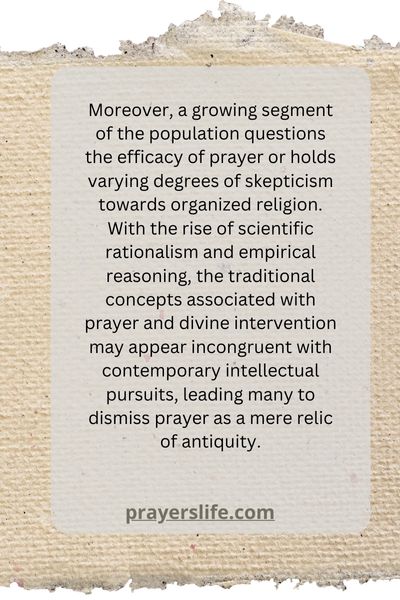
Personal Struggles and Disillusionment
For individuals grappling with personal hardships, the act of praying may seem futile or ineffective in alleviating their sufferings. In the face of adversity and unanswered prayers, disillusionment can set in, fostering a sense of detachment from spiritual practices and a loss of faith in the power of prayer to bring about tangible change.
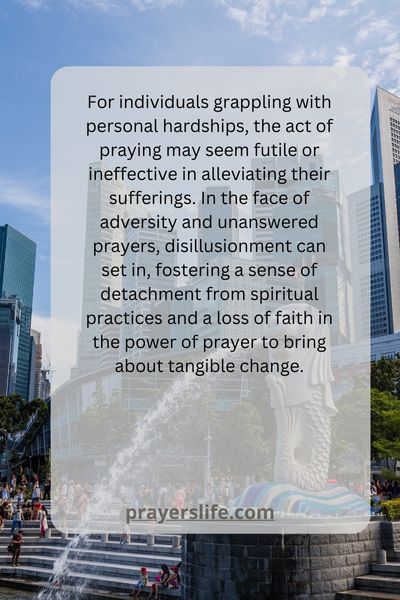
Alternatives to Traditional Prayer Practices
Nevertheless, as the practice of traditional prayer wanes, alternative forms of spiritual engagement gain traction. Mindfulness practices, meditation, and self-reflection serve as viable substitutes for those seeking inner peace and emotional stability, providing a different avenue for connecting with one’s inner self and fostering a sense of tranquility amidst the chaos of daily life.
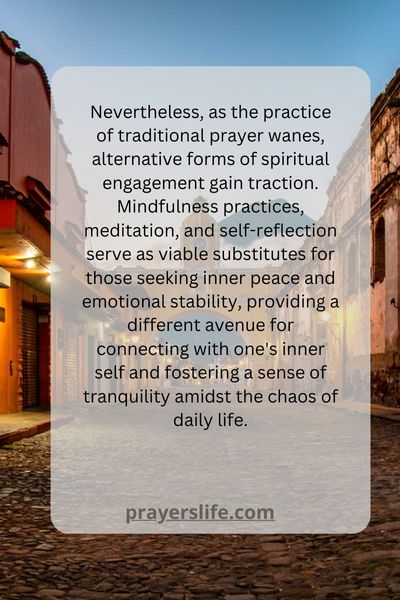
The Role of Science and Secularism
Furthermore, the ascendancy of scientific reasoning and secular ideologies in contemporary society has led to a decline in the perceived relevance of prayer. With advancements in technology and the proliferation of rationalistic discourse, individuals often seek tangible evidence and logical explanations, rendering the abstract notions of prayer and spirituality less appealing to those inclined towards empirical reasoning and evidence-based thinking.
Impact of Modern Society and Technology
The pervasive influence of modern society and technology also contributes to the diminishing significance of prayer. The constant bombardment of digital stimuli and the lure of instant gratification steer individuals away from introspective practices, fostering a culture of superficial connections and materialistic pursuits that often eclipse the profound insights that prayer and spirituality can provide.
Social and Cultural Influences on Prayer Habits
Moreover, cultural and social dynamics play a pivotal role in shaping the attitudes towards prayer. As societal norms evolve and cultural values undergo transformation, the importance attached to prayer may wane, particularly among younger generations who are more inclined towards individualistic and secular worldviews, thereby fostering a shift away from traditional religious practices.
Psychological and Emotional Perspectives on Prayer
From a psychological and emotional standpoint, prayer serves as a therapeutic outlet for individuals grappling with stress, anxiety, and emotional turmoil. However, the absence of an immediate tangible outcome or the perceived lack of divine intervention may lead some individuals to question the efficacy of prayer in addressing their emotional and psychological struggles, prompting them to explore alternative coping mechanisms and therapeutic approaches.
Coping Mechanisms and Therapeutic Alternatives
Consequently, the emergence of various coping mechanisms and therapeutic alternatives offers individuals a diverse array of options to navigate life’s challenges. Psychotherapy, self-help techniques, and holistic wellness practices present viable avenues for fostering personal growth and emotional resilience, providing individuals with practical tools to manage their mental and emotional well-being without solely relying on traditional prayer practices.
Addressing the Issue Within Religious Communities
Within religious communities, the declining engagement in prayer poses a significant challenge that necessitates introspection and adaptation. Religious leaders and institutions must grapple with the changing dynamics of contemporary life, striving to create meaningful avenues for spiritual engagement that resonate with the evolving sensibilities and needs of their congregations, fostering a renewed sense of relevance and connection to the spiritual teachings that underpin their faith.
Finding Spirituality Through Other Means
Amidst the changing landscape of spiritual practices, individuals explore diverse avenues to foster a sense of spirituality and inner connection. Engaging in nature, participating in community service, and cultivating meaningful relationships serve as alternative pathways for individuals seeking to nourish their souls and establish a profound sense of interconnectedness with the world around them, transcending the confines of traditional religious frameworks.
Rediscovering the Essence of Prayer
Nonetheless, amidst the contemporary challenges and evolving paradigms, the essence of prayer remains a timeless conduit for introspection, self-transformation, and the cultivation of compassion and empathy. Rediscovering the true essence of prayer entails transcending the confines of dogma and ritual, embracing the innate spirituality that resides within each individual, and forging a deeper connection with the transcendent aspects of existence that transcend the limitations of time and space.
The Significance of Self-Reflection and Mindfulness
In essence, fostering a culture of self-reflection and mindfulness serves as the cornerstone for reviving the practice of prayer in contemporary life. By cultivating a habit of introspection, individuals can embark on a transformative journey towards self-discovery and spiritual enlightenment, fostering a profound connection with the divine essence that permeates the fabric of existence.
Emphasizing the Importance of Inner Connection
In conclusion, the waning significance of prayer in contemporary society reflects a broader cultural shift towards individualism, secularism, and materialistic pursuits. However, amidst the complex web of societal dynamics and personal struggles, the essence of prayer endures as a timeless beacon of hope and spiritual nourishment. By fostering a culture of introspection, empathy, and mindfulness, individuals can reignite the flame of spirituality within their hearts, forging a profound connection with the transcendent dimensions of existence that transcend the limitations of human understanding.
Conclusion
The dwindling inclination towards prayer in contemporary society reflects a nuanced landscape where traditional spiritual practices are being re-evaluated and redefined. While some perceive prayer as an anchor of solace and guidance, others view it as a relic of a bygone era, unable to provide substantial solutions to the complex challenges of the modern world.
The intricate web of personal beliefs, scientific rationality, and societal evolution has reshaped the perception and practice of prayer, prompting individuals to seek alternative avenues for connection, solace, and meaning.
FAQs
- Is prayer still relevant in modern society? Yes, prayer remains relevant as a means of fostering inner connection and spiritual nourishment, transcending the confines of contemporary challenges.
- Can mindfulness serve as a substitute for prayer? Mindfulness can provide individuals with a complementary practice that fosters self-awareness and emotional well-being, serving as an alternative to traditional prayer practices.
- How can religious communities adapt to the changing dynamics of prayer habits? Religious communities can adapt by fostering a culture of inclusivity, addressing the evolving needs of their congregations, and emphasizing the core spiritual teachings that resonate with contemporary sensibilities.








